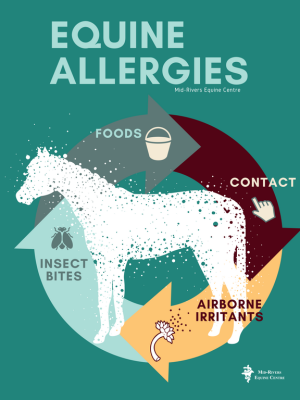Allergens fall into 4 categories:
 Biting Insects: Reactions from insect bits are the number one trigger for an allergic reactions. A well implement barn fly and pest suppression protocol can reduce risk.
Biting Insects: Reactions from insect bits are the number one trigger for an allergic reactions. A well implement barn fly and pest suppression protocol can reduce risk.
- Spray horse with fly spray daily
- Clean manure out of paddocks and stalls daily
- Cover horse with fly sheet and mask during turnout
- Fly traps or fly paper in barn
- Barn misting systems
- Organic fly control with fly larva-eating insects
- Install fans in stalls
Airborne Allergens: These include mold, dust,smoke and pollen. They can affect the respiratory system and cause skin irritations. An allergy test and allergy injections are generally recommended for horses suffering with seasonal or airborne allergies.
Food: This is one of the least common allergic triggers. Horses can have an allergic reaction to a specific type of hay or possibly and an ingredient in feed. It is common to see a horse with a food allergy break out in hives.
Contact: Anything that gets on the horse’s skin has the potential to cause irritation. Weeds, tall grasses, trees, topical sprays, and mold can all cause a dermatological reaction. Signs include:
- Hair loss
- Dull coat
- Swelling itchy red skin
- Flaky or scaly skin
Thankfully, like human medicine, allergy testing and injections are available for your horse.